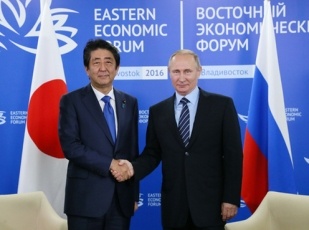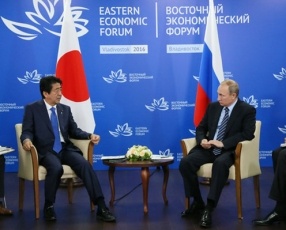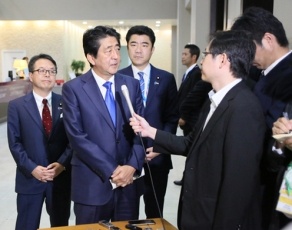Japan-Russia Relations
Japan-Russia Summit Meeting on the Occasion of the 2nd Eastern Economic Forum
September 3, 2016
 Photo: Cabinet Public Relations Office
Photo: Cabinet Public Relations Office
 Photo: Cabinet Public Relations Office
Photo: Cabinet Public Relations Office
 Photo: Cabinet Public Relations Office
Photo: Cabinet Public Relations Office
On September 2, Mr. Shinzo Abe, Prime Minister of Japan, who was visiting Vladivostok, the Russian Federation, held a Japan-Russia Summit Meeting with Mr. Vladimir Vladimirovich Putin, President of the Russian Federation, for approximately three hours and 10 minutes. The meeting took the form of a Summit Meeting commencing at 6:20 p.m. local time for approximately two hours and 5 minutes (including 55 minutes session between the two leaders just with interpreters), followed by a working dinner lasting approximately one hour and 5 minutes.
1 Japan-Russia overall relations (political dialogue and visits by officials)
- With regard to a visit to Japan by President Putin, Prime Minister Abe invited President Putin to visit Yamaguchi Prefecture on December 15, and the two sides agreed to hold a Summit Meeting. The two leaders shared the view that in the run up to the visit they would move ahead with preparations in areas such as economics and politics, including negotiations for a peace treaty.
- They also shared the view that they would hold another Summit Meeting on the occasion of the Asia-Pacific Economic Cooperation (APEC) Leaders' Meeting that will be held in November in Lima, the Republic of Peru.
- Prime Minister Abe explained that amid the positive trend of progress with Japan-Russia relations since the previous Summit Meeting, he had been personally issuing direct instructions and moving ahead with the preparations for President Putin's visit to Japan.
2 Issue of concluding a peace treaty
With regard to the issue of concluding a peace treaty, Prime Minister Abe stated that he hoped the two leaders would firmly follow up the outcome of the meeting in Sochi. Subsequently, in a serious yet congenial atmosphere, the two leaders spent time holding a discussion that to shed light on a path for making concrete progress in the negotiations based on a new approach.
3 Security field
- Prime Minister Abe noted that Japan-Russia security discussions were held between the Foreign Ministries in July and the meaningful discussion that would be useful for trust building was carried out. Prime Minister Abe stated that he intended to continue the discussion at various levels and that he also hoped to continue to exchange views using the channel between Mr. Shotaro Yachi, Secretary General of the National Security Secretariat of Japan, and Mr. Nikolai Patrushev, Secretary of the Security Council of Russia.
- In addition, Prime Minister Abe also pointed out that interactions between defense authorities were continuing. In connection with cooperation between the Japan Coast Guard and Russia's Border Service, Prime Minister Abe stated that it was deeply significant that a multilateral exercise involving coast guard agencies including from China and the Republic of Korea was successfully held off the coast of Vladivostok last month, with Japan's Echigo patrol vessel participating as well.
4 Economic field, individual matters
(1) Economic field
- Prime Minister Abe introduced steps to materialize the eight-point (see Note) cooperation plan presented at the Summit Meeting in Sochi. He explained that high-level exchanges between the two countries, including visits to Japan by Mr. Yury Trutnev, Deputy Prime Minister, and Mr. Alexei Ulyukayev, Minister of Economic Development, and the visit to Russia by Mr. Teruo Asada, Chair of the Japan-Russia Business Cooperation Committee at Keidanren (Japan Business Federation), have been realized. Furthermore, Prime Minister Abe explained that he had appointed Mr. Hiroshige Seko, as Minister for Economic Cooperation with Russia, who is responsible for realizing the cooperation plan, and arranged a structure in which all the relevant ministries and agencies are directly managed by the Prime Minister's Office, under Minister Seko.
- A discussion took place among participants from Japan and Russia, including the two leaders. As a result, it was agreed that the two countries would deepen discussions toward realizing cooperation in the future, including expanding exchanges between small- and medium-sized enterprises (SMEs), energy cooperation, and developing industries and export bases in the Far East.
(2) Fishing industry
Prime Minister Abe explained that the fishing industry was a traditional field of cooperation that had provided Japan and Russia with profits from their bountiful seas, and that he was personally placing an emphasis on it. Prime Minister Abe stated that he hoped that attention would be paid to ensure the industry could continue sustainable operation under the existing frameworks.In response, President Putin stated that the ban on drift nets was not a measure directed at Japan, it was made in the interests of environmental conservation, and that he intended to cooperate so that Japanese fishermen could operate in other fields in Russian waters.
5 International affairs
(1) North Korea
Prime Minister Abe explained that the submarine-launched ballistic missile (SLBM) fired by North Korea in August represented a new, qualitatively different threat to those seen thus far. Prime Minister Abe said North Korea's provocative acts were a clear violation of the relevant United Nations Security Council (UNSC) resolutions, and that the UNSC needed to implement severe measures. Prime Minister Abe also emphasized that there was no change to Japan's determination to make every effort to promptly resolve the abductions issue, and stated that he hoped to continue cooperating with Russia on resolving outstanding issues of concern.In response, President Putin explained that attempts by North Korea to legitimize the nuclear problem were unacceptable, and stated that it would be important to resumption of the Six-Party Talks to resolve the problem.
Additionally, Prime Minister Abe pointed out that having a meeting for the sake of a meeting is meaningless, and discussions that produce concrete results must take place.

